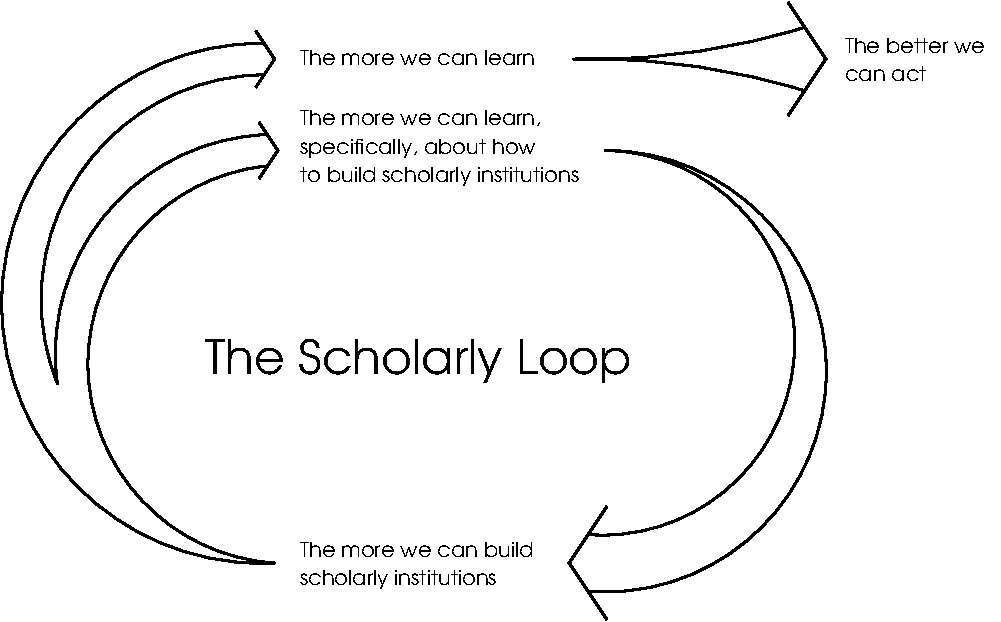What's wrong with the university system?
- The university system does not value students.
-
Tuition is overpriced, classes are overfilled, cafeteria food is unhealthy, and creativity and passion for learning go unrewarded. The students are conceived of as passive recipients of information, rather than active participants in learning. Moreover, many students cannot even access the university for a number of reasons, from financial challenges to family obligations.
- The university system does not value most professors.
-
More than 75% of professors are off the tenure track, which means that have low wages and large teaching loads with no opportunity for promotion to tenure (source). As New Faculty Majority astutely observes,
Faculty working conditions are student learning conditions
. - The university system does not value scholarship.
-
Rather, it values false proxies for scholarship, such as grades, quantity of publications, and research grants. When everybody's time is taken up with these proxies, real scholarship suffers.
- The university system has a monopoly on learning.
-
In spite of all its faults, it is hard to imagine an alternative.
This problem has ramifications on:
- The public:
When doctors are miseducated, their patients bear the cost. When teachers are miseducated, their students bear the cost. When parents are miseducated, their children bear the cost. And so on. Miseducation fails everyone.
- The future of humanity:
We are in a perilous historical moment, and our actions now will have ramifications on generations to come. In order to act wisely in order to create the world we want to live in, it is imperative that we have mechanisms for societal self-reflection.
- The systemically disadvantaged:
The university's lack of support for its students and professors has a disporportionate impact on those who are already most neglected by our society, such as BIPOC, LGBTQ, undocumented people, and poor people.
- The aspiring scholar:
Those who wish to pursue a lifelong vocation of scholarship have no other option than to spend years in the cutthroat competition of academia in the hope of eventually achieving tenure. Once they achieve tenure, they won't even have much time to study or do research.
A Solution
Rather than attempting to reform the universities, I advocate building new scholarly institutions. Let's break down what I mean by this.
- Institution:
I use this word in the general, sociological sense, to mean any social regularity. Institutions can be virtual or in-person, formal or casual, centralized or decentralized, small or big.
- Scholarly:
By this I mean that the institutions are expressly designed to facilitate scholarly practices such as reading, writing, deep thinking, deep conversation, art, math, and science. It seems to me that what is common to all these practices is that they are long uninterrupted flow states, and they transform the self.
Note that by this definition, universities are not scholarly institutions, because facilitating scholarly practices is just one purpose, on par with job training, holding space for children to become adults, making people "cultured", and transmission, growth, and maintenance of prestige. Caught between such various purposes, the facilitation of scholarly practices is not a very high priority. The easiest way to see this is by considering the food quality; how conducive is bad nutrition to flow states?
Scholarly institutions must ensure that scholars' needs are met
In order to facilitate scholarly practices, a scholarly institution must strive to ensure access to the following for all scholars:
- Support:
- Funding, housing, food, and healthcare.
- Guidance:
- In what to practice, and how to practice it.
- Community:
- Scholarship cannot be done alone.
- Certification:
- In order to make learning visible to the outside world.
How do we do that?
By learning how. If we truly believe in the promise of education, we believe that we can do anything possible provided we learn how to do it. So in order to build scholarly institutions, we must study the following sorts of things (this list is provisional):
- The past: History of Universities and Monasteries. History of liberatory education.
- The present: Critical University Studies. Current alternative educational projects. Neoliberalism.
- The future: Social Entrepreneurship and Activism, specifically relating to building scholarly institutions. Organizational theory. Critical pedagogy. The Study of Intentional Community.
The more we learn this stuff, the better we can build scholarly institutions, and the better we can build them, the more we can do scholarly practices, including learning specifically about how to build scholarly isntitutions. This positive feedback loop is called the scholarly loop and it is the engine of Let Me Think. When this engine is started it will cause a chain reaction creating a new ecosystem of scholarly institutions and massively broadening access to scholarly practice.

What is Let Me Think?
Let Me Think is a student collective which utilizes the Scholarly Loop to create the material conditions necessary for scholarship. Our past thinking can be found here. Our vision is a world where scholarly practice is accessible, and our mission is to enact and envision the future of scholarly institutions, informed by the past and present of scholarship. See here to get involved.
What is Scholarship Workshop?
Scholarship Workshop 2023, organized by Let Me Think, is a 2-month in-person incubator for new scholarly institutions, taking place this summer in a rural location not far from New York City. See here to learn more.
